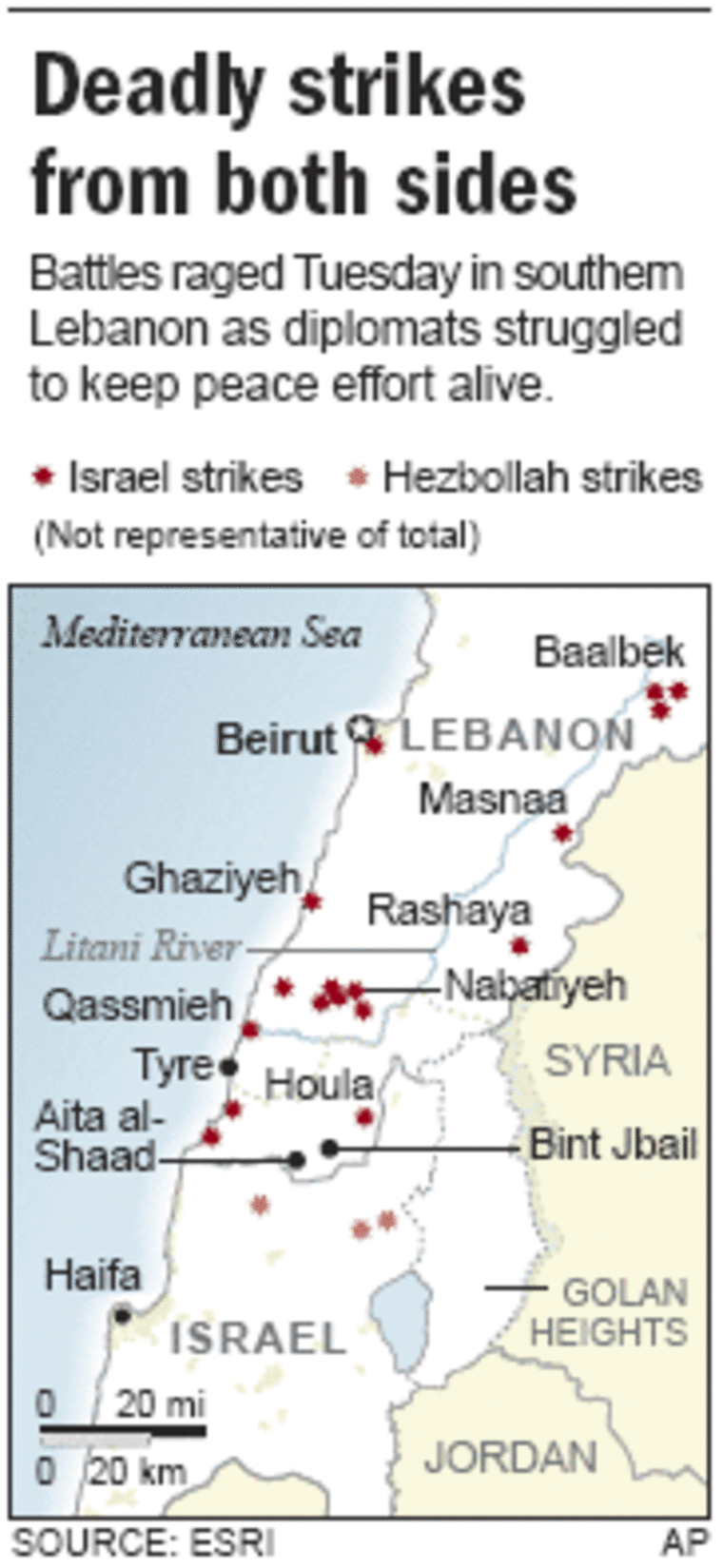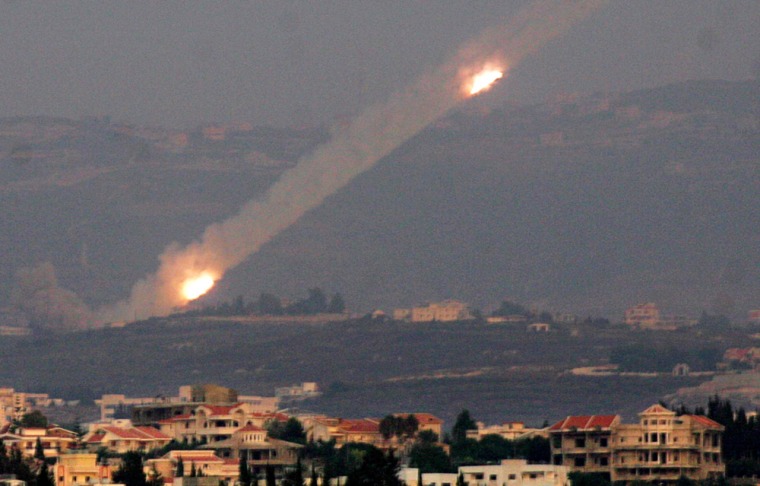Late last week while guarding a house in southern Lebanon that Israeli forces were using as a command post, Cpl. Matan Tyler received an unusual order from his commander: Watch out for guys wearing Israeli uniforms.
A day earlier, a nearby regiment had been approached by fighters wearing familiar olive shirts and vests with Hebrew writing, Tyler said he was told. The fighters -- Hezbollah militiamen disguised as Israelis -- opened fire on a house full of Israeli soldiers.
"You really can't underestimate the Hezbollah," said Tyler, 20, a member of the army's Nahal Brigade. "They are the masters of the field. They know the area better than us. They know where to hide and when to move. They always know where we are."
The incident is just one among dozens of examples of an enemy that has proven more resilient and better-equipped than Israeli military forces anticipated. After nearly four weeks of air attacks and ground combat, Israeli military officials say that they have killed only a small fraction of Hezbollah's fighters and that the group still has hundreds of launchers and thousands of rockets at its disposal.
"What we face is an infantry division with state-of-the-art weaponry -- night-vision gear, advanced rifles, well-equipped -- deployed along our border," said Brig. Gen. Yossi Kuperwasser, who until last month was director of analysis for Israeli military intelligence. "They have some of the most advanced antitank missiles in the world."
Elusive enemy
In more than two dozen interviews at army bases, hotels, artillery batteries and staging points for their entry into Lebanon since the heaviest ground fighting began last week, Israeli soldiers expressed confidence in their superiority over Hezbollah, but frustration that they are fighting an elusive enemy as difficult to find as it is to defeat.

"Most of the time we only see them when they want to draw attention to themselves, then they kick us from behind," said Tyler, who was resting with his battalion at a lakefront hotel near Tiberias after a week in southern Lebanon. "It's horrible, yes. You feel -- not weak, but how do you say it, threatened? There is always, always uncertainty."
Several soldiers said they were surprised by how long the operation has taken. When Israelis invaded Lebanon in 1982, they reached to within 10 miles of Beirut in two days. In the current conflict, after more than three weeks of fighting, the heaviest ground combat is still in a string of towns along the border.
"It's so slow and you're just going crazy. You're not really getting very far in there and it's brutally hot just sitting in those houses," said Cpl. David Gross, 22, of Livingston, N.J., who moved to Israel two years ago to join the army.
"Look, we're all smart enough to know it's probably best that they do it this way. Fewer people get killed," he added. "But it's also hard because I don't know if we will ever be able to stop the rocket attacks. You just feel like we'll keep pushing them back and they'll just shoot the rockets farther. Is that frustrating? Yes."
Booby traps and hiding places
The soldiers described a battlefield littered with booby traps and fortified by fighters who have been preparing to repel a ground invasion since Israeli withdrew from southern Lebanon six years ago, after an 18-year occupation.
Master Sgt. Yusaf, a scout for the army's Baram Brigade who spent 16 years fighting in southern Lebanon during the 1980s and 1990s and who spoke on the condition that only his first name be used, said comparing Hezbollah's capabilities then and now "is like talking about the difference between men who have guns and an army."
Moving at the front of an advancing infantry platoon, he is always on the lookout for traps and hiding places, he said during an interview at a base in Shomera, near the border, hours after leaving a village in southern Lebanon. He described one bunker near the Lebanese town of Maroun al-Ras that was more than 25 feet deep and contained a network of tunnels linking several large storage rooms and multiple entrances and exits. He said it was equipped with a camera at the entrance, linked to a monitor below to help Hezbollah fighters ambush Israeli soldiers.
Israeli soldiers and commanders are quick to point out that Israel is winning by most traditional measures, such as equipment destroyed, territory seized and casualties -- 61 Israeli soldiers have died in the fighting, along with about 450 Hezbollah fighters, by Israel's count. But in comments that echo those of earlier guerrilla conflicts, they also acknowledge that the two sides have different standards of success. "All they have to do is survive and some people will say they won," one soldier said in a recent interview near the Israeli border town of Avivim.
First Sgt. Dekel Peled, who suffered cuts to his head and hands in a Lebanese village 10 days ago when a mortar shell struck a house in which he was waiting, said he is fighting in a "a war that no one can be mentally prepared for."
He was interviewed at an army-run hotel in Kiryat Shemona this week as he returned to his unit, though he still can't fight because he lost feeling in his trigger finger.
"Some days it seems like it is going to be over tomorrow, and on other days I get the impression it can last another month," he said.
Short bursts of intense combat
Few said they had experienced sustained firefights. Rather, they said, there were long hours of edgy anticipation, and short bursts of intense combat. The most feared weapons in Hezbollah's arsenal, they said, are the antitank missiles that have been responsible for dozens of Israeli casualties, blasting through the armor of the most advanced Merkava tanks or at infantry soldiers maneuvering on foot.
Cpl. Eviatar Shalev, 19, described spotting a Hezbollah fighter standing 200 yards away and aiming a shoulder-fired missile at the house where he was posted. "He was already in the firing position, so we called up a combat helicopter," Shalev said. "We entered the inner-most part of the house. We put on all of our defensive gear and we prayed. When you are in there, you can't stop imagining a red spot on your window."
The fighter was killed by an Israeli airstrike before he could shoot the missile, Shalev said in an interview at the hotel in Kiryat Shemona.
Israeli commanders say Hezbollah has obtained its sophisticated weaponry from its main backers, Syria and Iran. "Some have Arabic inscriptions on them, some Iranian, some Russian," said Maj. Gen Udi Adam, commander of Israel's northern forces, in a recent briefing for reporters. "The ones with Russian on them come from Syria," he added.
Several soldiers said they felt the army should be striking harder at Hezbollah but was being held back by concern for civilian casualties. Lt. Col. Svika Nezer, the commander of an artillery battery a few miles outside Kiryat Shemona, said his unit was operating at about 20 percent of its firepower.
"We could do much, much more. But the orders we get are limited," said Nezer, a reservist who is a lawyer in civilian life.
Among the main challenges facing Israeli soldiers, they say, is that Hezbollah chooses to fight in and among civilian centers, making it difficult to target its fighters without killing bystanders. Lebanese officials and human rights organizations have criticized Israel for what they term indiscriminate bombing, but commanders say that, if anything, they err on the side of caution when deciding whom to shoot.
"There have been many times when we let go someone whom we knew was a terrorist because we are not sure we could take them down safely," Adam said. "Meanwhile, they try to kill as many of our civilians as they can."
‘Unfortunately, this is a lost war’
Lt. Itamar Abo, 20, on his way back to the front after a weekend at home in the northern town of Tzfat, said his friends and family grilled him throughout his time off about when the fighting would end and the rocket barrage would stop.
"When a Katyusha falls on somebody's house, it's hard to tell them this is going well. They keep saying, please get it over with. I don't know what to tell them," he said. "We have to do what we are doing, and I think it is helping, but I also think that no matter what, when this war is over, the threat will still be there, right on our border."
Seated nearby, Cpl. Shai Kaplan, 19, was blunt. "They are experts at deception. Everyone will think they won no matter what. That's how you win when there's a few thousand of you and 50,000 of us," he said. "The more of them we kill, the more of them who are generated. Unfortunately, this is a lost war."
Special correspondent Tal Zipper contributed to this report.
